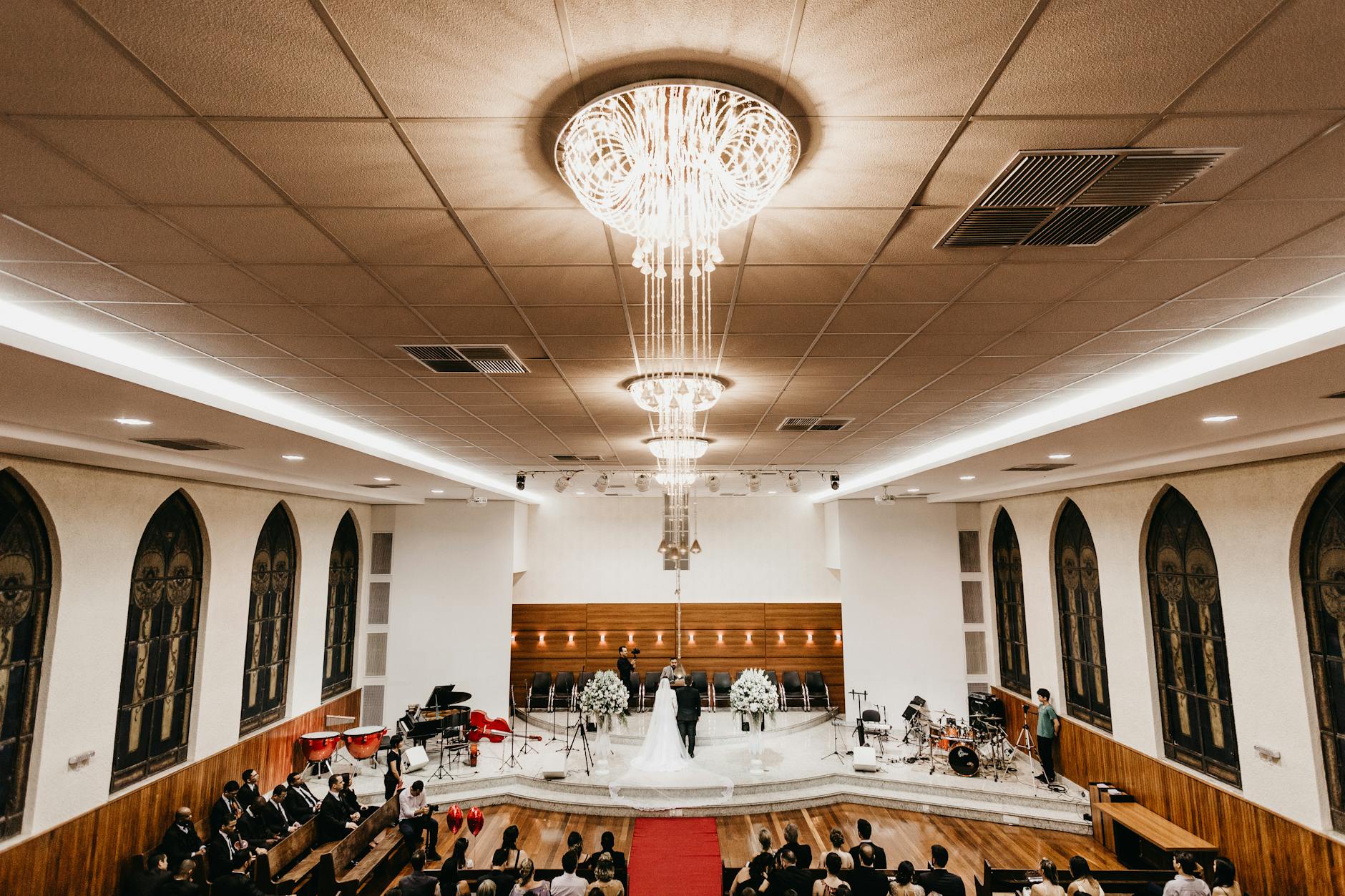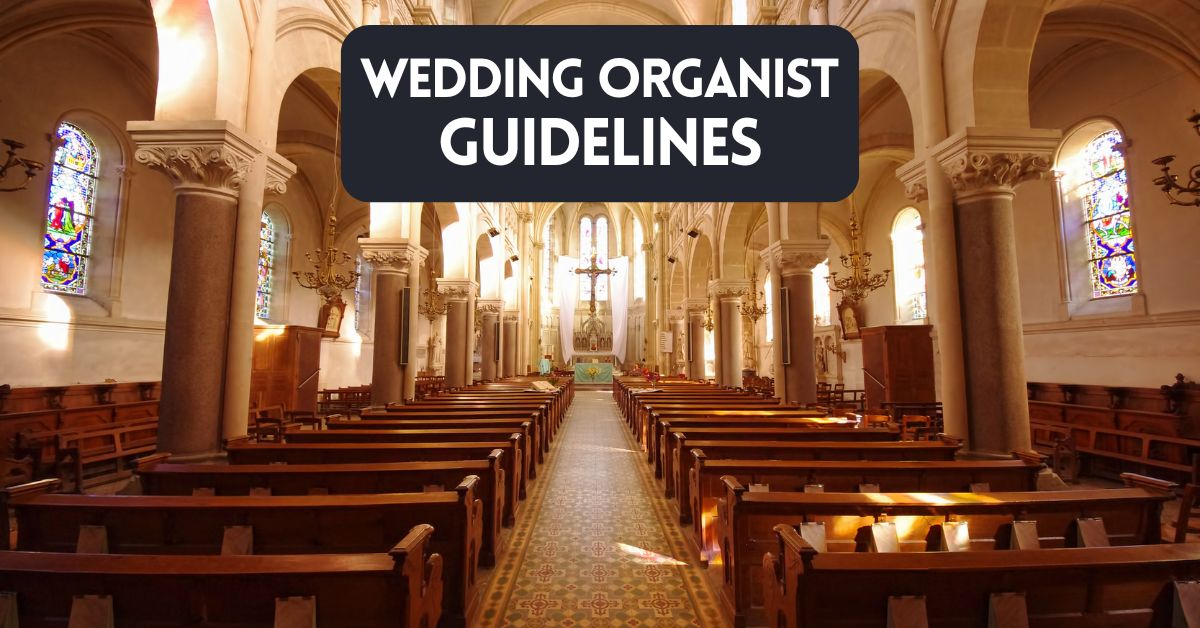Being a wedding organist isn’t just about hitting the right notes—it’s about setting the perfect tone for someone’s most special day. Whether you’re a seasoned professional or new to playing weddings, this guide will help you fine-tune your expertise and better prepare for every ceremony. I revisited survey data from members of the American Guild of Organists in Alabama for this article, plus some additional insights. We’ll cover fees, policies, music selection, logistics, and more. While the source survey is over 10 years old, it offers valuable perspectives for the wedding organist in the following guidelines. Let’s get started!
Azure Hills Music contains affiliate links and is a member of the Amazon Services LLC Associates Program. As an Amazon Associate, we earn from qualifying purchases at no extra cost to you when you purchase using one of these Amazon links. Read our disclaimer and privacy policy for more information.

Why Being a Wedding Organist Is Special
Tying the knot is often one of the happiest days in a couple’s life—and as the organist, you play a key role in crafting the atmosphere for that heartfelt occasion. Your music is more than sound; it’s emotion. It inspires joy, creates memories, and underscores once-in-a-lifetime moments. But it also requires preparation, flexibility, and navigating multiple considerations to ensure everything flows seamlessly.
Here’s a step-by-step look at considerations for wedding organists, supplemented with helpful statistics from the Alabama Wedding Survey and practical advice.
Understanding Wedding Fees and Payment Practices
Standard Rates for Wedding Organists
One of the most common questions organists face is, “What should I charge?” The survey revealed diverse fee structures, with most respondents aligning their rates between $200-$300. Here’s the breakdown:
- $100–$150 — 5.9%
- $150–$200 — 11.8%
- $200–$250 — 35.3%
- $250–$300 — 23.5%
- $300+ — 17.6%
My parish church has a standard fee schedule for weddings and funerals, currently $175 as of 2025. If you’re new to playing weddings, consider pricing yourself competitively, considering the time, skill, and preparation involved. And remember, these rates often include additional services.
Services Often Included in Fees
Many organists provide more than just music during the ceremony. According to the survey, fees often cover:
- Initial music selection meetings (100%)
- Rehearsals with the wedding couple or other musicians (76.5%)
- Special rehearsals with soloists or instrumentalists (70.6%)
In my early playing days, I would often make myself available for wedding rehearsals. I almost never do this anymore.
Tip for beginners: Clearly communicate what your fee includes so there’s no confusion.
When Should Organists Be Paid?
Timely payment remains essential to avoid misunderstandings. Most organists surveyed stated they expect payment:
- At the rehearsal (47.1%)
- At or immediately after the wedding (35.3%)
Securing a deposit when the wedding is booked can also provide peace of mind. While I’ve been playing wedding for decades, I have had very little negative experience with payments. Although within just the past six months, I’ve had one wedding go completely unpaid (as well as everyone else connected to that same wedding) and another where the payment was quite late. As a result, I’m developing a contract to mitigate this situation in the future and my new policy is payment in advance of the ceremony.
Beyond Performing: Policies Every Organist Should Set
Travel Fees for Long-Distance Weddings
When the wedding involves travel, 41.2% of organists charge an extra fee, often in line with the IRS mileage reimbursement rate. If you’re commuting more than 30 miles each way, adding a travel charge to cover expenses is reasonable.
Restrictions on Music Choices
One sensitive area wedding organists often encounter is music selection. Some venues or organists have strict policies and music guidelines. For example:
- Secular songs are not permitted in many cases (52.9%)
- Traditional pieces like Wagner’s Bridal Chorus or Mendelssohn’s Wedding March are restricted by 17.6%.
If the couple requests unconventional pieces, provide guidance on what’s appropriate while remaining collaborative. A great approach is offering curated alternatives, such as Jesu, Joy of Man’s Desiring by Bach or Trumpet Voluntary by Clarke.
Handling Substitute Organists
If you’re the regular organist at a church, it’s wise to have a clear policy in place in case someone else performs in your absence. The survey found that 64.7% of regular organists don’t charge a fee in such scenarios—though some request compensation for their time if they assist or prepare the visiting organist.
Tip for regular organists: Ensure the substitute matches the level of professionalism expected at your venue to uphold your reputation.
Planning the Perfect Wedding Performance
Attending the Rehearsal
The rehearsal is your chance to ensure the couple (and the rest of the wedding party) feel confident. Nearly 88.2% of surveyed organists said they attend wedding rehearsals—and often, this attendance is included in their fee. Use this time to check acoustics, confirm cues, and work closely with any soloists or instrumentalists.
Selecting Processional and Recessional Favorites
Wondering what music couples love most? The survey pointed to some timeless classics:
Top Processional Picks:
- Trumpet Voluntary/Prince of Denmark’s March by Purcell/Clarke (82.5%)
- Canon in D by Pachelbel (17.6%)
Top Recessional Picks:
- Handel’s Hornpipe or Allegro Maestoso from Water Music (52.9%)
- Mendelssohn’s Wedding March (29.4%)
I generally ask the bride or groom about their preferences for processional and recessional music. Having a selection of these popular pieces on hand is a great way to guide indecisive couples or to delight guests who appreciate traditional works.
Managing Special Requests
While you’ll likely play many of the same beloved songs over time, weddings are all about customization. Some couples may request original compositions or special arrangements. Be clear about timelines and fees for these added services, as 17.6% of organists surveyed charge extra for them.
Tip for balancing special requests with practicality? Add established favorites to a wedding music guide you share with couples, simplifying decision-making.
Building a Sense of Community
Playing for weddings goes beyond the technicalities—it’s about connecting with couples on one of the most important days of their lives. Wonderful feedback from survey respondents included reflections like:
- “Brides often admit they have no idea what music to choose—mothers frequently step in.”
- “Couples sometimes pick songs based on wedding music CDs, which often works well!”
As a wedding organist, be a resource of reassurance and guidance. Offer listening sessions, provide suggestions, and help couples feel confident as they plan their dream ceremony.
Additionally, collaborating within your local community or chapter (like the American Guild of Organists) creates opportunities to refine your craft, build professional connections, and share ideas.
Make the Moment Memorable
Wedding organists bring a unique blend of talent, professionalism, and heart to every ceremony, standing at the intersection of tradition and personal expression. Whether fine-tuning your policies, recommending pieces, or perfecting your performance, your role enriches the wedding day experience.
Want more tips on being the best at what you do? Connect with your local organist community, and don’t forget to add to your repertoire continuously.
Thanks for reading this article on wedding organist guidelines. Happy playing!
Arthur Dobrucki
Sources include: American Guild of Organists: Wedding Survey (January 2009) – James Conely

